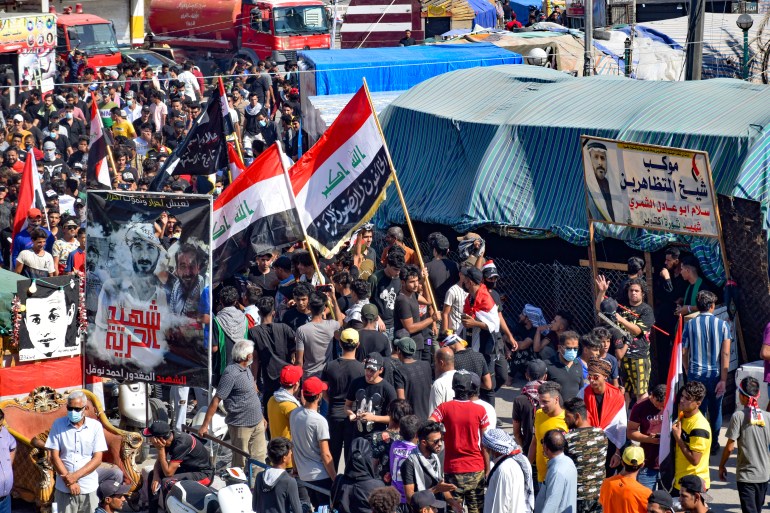
From ancient battles to last week’s deadly clashes between protesters and supporters of cleric Muqtada al-Sadr, Iraq’s Dhi Qar governorate has often been referred to as the centre of the country’s rebellion and uprisings.
In November 2019, at the height of the countrywide anti-government protests, its capital Nasiriya was referred to as the heart of the uprising. A symbolic move that for some holds true to this day.
“Nasiriya is the fire of the revolution,” protester Ahmed al-Tamimi said over the telephone from the city’s main protest site, Haboubi Square.
“The martyrs went with a flag and they were killed in cold blood – this is the revolution of the martyrs,” he said, referring to the 129 protesters from Dhi Qar who lost their lives over the course of one year.
Last week eight more demonstrators were killed on the streets of Nasiriya when clashes broke out between protesters and followers of the popular al-Sadr
The violence coincided with the one-year anniversary of the killing of dozens of protesters in what became Dhi Qar’s bloodiest incident since the beginning of the demonstrations.
Al-Tamimi, who has been at the centre of Nasiriya’s uprising since October 2019, admitted fault on both sides.
“They [al-Sadr supporters] had bad people and we had bad people. I cannot say that everyone at [Haboubi] square is innocent, some belong to parties [and] infiltrated the square,” said al-Tamimi. “What happened was a mistake on both sides.”
‘Comparative neglect’
By Tuesday, Nasiriya protesters were back at the site, albeit surrounded by federal police and at the mercy of a curfew. But unlike Baghdad’s Tahrir Square, where in October tents were cleared out and roads reopened, Haboubi Square is still alive with demonstrators.
“The people of Nasiriya have always been praised for their revolutionary belief,” said Sheikh Imad Rikaby of the Rikaby tribe. Like him, Iraq commentators have frequently alluded to Nasiriya’s long history of rebellion and revolutionary politics to explain Dhi Qar’s central role in the protests.
“I think the real explanation is likely more mundane and reflects primarily the comparative neglect of the province by the federal government when compared with Basra,” said Ben Robin-D’Cruz, a researcher on Iraqi politics at the University of Edinburgh.
 Iraqis rally to mark the first anniversary of massive anti-government protests in the southern city of Nasiriya in Dhi Qar province in October [Asaad Niazi/AFP]
Iraqis rally to mark the first anniversary of massive anti-government protests in the southern city of Nasiriya in Dhi Qar province in October [Asaad Niazi/AFP]But in a nationwide uprising that has seen the killing of more than 600 people at the hands of security forces, collective myths are key in fuelling morale. Nasiriya is known across Iraq for its humble and battle-hardened people.However, argued Robin-D’Cruz, their “heroic resistance to extreme violence … doesn’t mean the protest movement was at the heart of the October 2019 movement in terms of organisation and strategic decision-making”.
Instead, protesters in the province were the most reluctant to “engage in the political process or forge alliances with other political forces”.
‘Reform and restructure’
But some hope a corner was turned this week, opening the way for the Haboubi Square movement to play a role in local decision-making.
On Monday, the leaders of Dhi Qar’s protest movement handed a list of 13 demands to the team sent to Nasiriya by Prime Minister Mustafa al-Kadhimi following the clashes on Friday.
“We will reform our organisation,” said protester al-Tamimi. “We will restructure and clear out the unruly members.”
One of the demands, said al-Tamimi, was that the camp would only be removed if mutually agreed upon by both protesters and local authorities. Another point, he added, was the overhaul of the local government.
“Our dreams were stolen, the dreams of our children were stolen,” said al-Tamimi. “There is nothing we have that is functional. No hospital, no school … Everything has been destroyed.”
On Tuesday afternoon, al-Tamimi was back in what he said was a “calm” square, intent on rebuilding what had been lost in Friday’s clashes.


No comments:
Post a Comment
Note: only a member of this blog may post a comment.